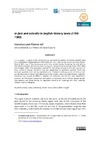Please use this identifier to cite or link to this item:
https://accedacris.ulpgc.es/jspui/handle/10553/58454
| Title: | "In fact" and "actually" in English history texts (1700- 1900) | Authors: | Alvarez Gil, Francisco J. | UNESCO Clasification: | 570201 Lingüística histórica 570107 Lengua y literatura 550510 Filología |
Keywords: | Actually In fact Evidentiality Coruña Corpus Stance, et al |
Issue Date: | 2017 | Journal: | LFE. Revista de Lenguas para Fines Específicos | Abstract: | In this paper, I analyse evidential devices as stancetaking markers in history scientific texts from the Modern English period (1700-1900). For this, I will use the Corpus of History English Texts (CHET), one of the subcorpora within the Coruña Corpus, focussing the attention on how these adverbial devices are used to express interpersonal meanings (Hoye 1997; Biber and Finegan 1988). The adverbials selected for this study, actually and in fact, are said to show authorial stance, therefore they are categorised as epistemic adverbs. From the excerpts available, their use by eighteenth and nineteenth century writers of history texts will be described showing that depending on the context, they may fulfil several pragmatic functions, e.g. indicating different degrees of authorial commitment and detachment towards the information presented, persuasion or politeness and it will be analise as well how authors use those devices to negotiate interactional meanings with their potential readers, mostly colleagues. | URI: | https://accedacris.ulpgc.es/handle/10553/58454 | ISSN: | 1133-1127 | Source: | LFE. Revista de lenguas para fines específicos [eISSN 2340-8561], v. 23 (2), p. 247-262 | URL: | http://dialnet.unirioja.es/servlet/articulo?codigo=6677892 |
| Appears in Collections: | Artículos |
WEB OF SCIENCETM
Citations
3
checked on Feb 25, 2024
Page view(s)
251
checked on Jan 15, 2026
Download(s)
135
checked on Jan 15, 2026
Google ScholarTM
Check
Share
Export metadata
Items in accedaCRIS are protected by copyright, with all rights reserved, unless otherwise indicated.
